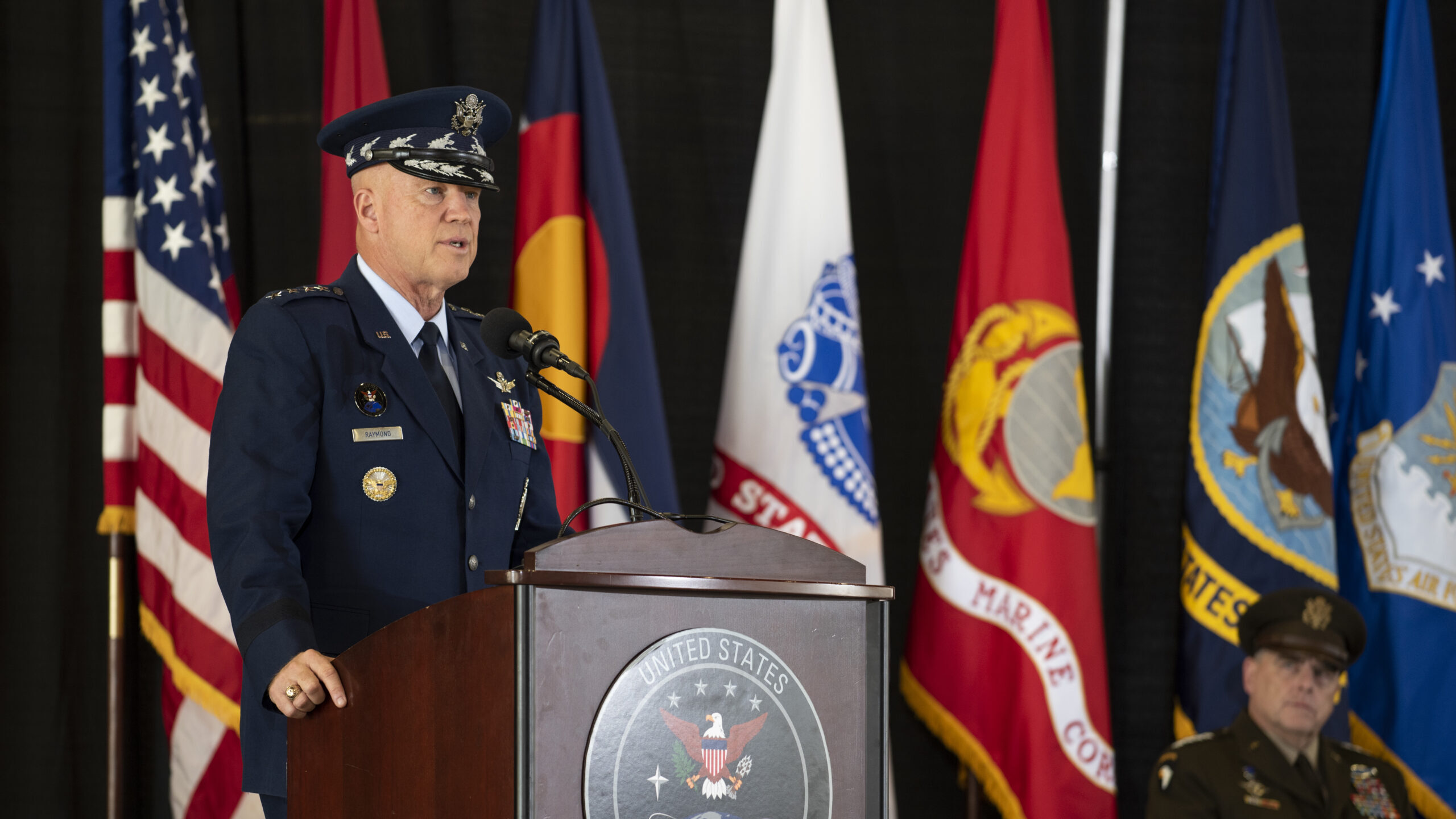
Gen. John “Jay” Raymond. Chief of Space Operations, U.S. Space Force, Commander, U.S. Space Command, provides remarks at the USSPACECOM Change of Command at Peterson Air Force Base, Colorado Springs, CO. August 20th, 2020. Photo by USSPACECOM Public Affairs. (Department of Defense photo by Lewis Carlyle)
WASHINGTON: The Government Accountability Office identified “significant shortfalls” in the process the Air Force used to decide where to base Space Command headquarters, according to a review released Thursday.
“While the January 2021 selection of Redstone Arsenal as the preferred location for U.S. Space Command headquarters was consistent with the Air Force’s analysis, our assessment of the Air Force’s revised selection process … identified significant shortfalls in its transparency and credibility,” the congressional watchdog agency found.
GAO’s assessment, the public version of which was redacted at the request of the Air Force, echoes the findings of the Pentagon’s own Office of the Inspector General (OIG), which found then-President Donald Trump’s decision to headquarter Space Command in Huntsville, Ala., “reasonable.”
But both reviews also cited concerns about parts of the process, pointing to: a lack of good documentation about how certain decisions were made, the midstream change in criteria for down-selecting sites; and the way the views of top brass resulted a last-minute change that flipped the Air Force’s first choice from Huntsville to Colorado Springs. Colorado Springs hosts Peterson SFB, which is currently the temporary home of SPACECOM HQ.
RELATED: Exclusive: OIG finds Trump’s Huntsville choice for SPACECOM HQ justified
But while the OIG report investigated the adequacy and implementation of the process vis-a-vis Defense Department and Air Force rules, the GAO compared the complicated process used in 2020 by the Department of the Air Force to “best practices” for undertaking a formal Analysis of Alternatives (AOA). AOAs are a type of cost-benefits study primarily used by the Defense Department for assessing major acquisitions programs — and one that the Air Force in its response to the GAO report argues isn’t applicable for basing decisions.
“The recommendation is at best a fiat, ostensibly to appease Colorado’s governor and congressional delegation, and it remains to be seen if a full-blown Analysis of Alternatives would ever be appropriate for something as infrequent as a Base Selection,” said one well-placed government official very familiar with the long saga of the basing decision. “It would seem however, given the now years of political intrigue, that an Analysis of Alternatives could have been done: in this SINGULAR case.”
The 2020 basing process was actually the second attempt by the Air Force to find a suitable home for SPACECOM, following a 2018-2019 review that also initially favored Huntsville but ended up landing on Colorado Springs. That review was scrapped in November 2019 by then-Air Force Secretary Barbara Barrett in order to widen the selection criteria. The draft version of the OIG report, obtained exclusively by Breaking Defense, showed that Huntsville also took first place in the second review based on a myriad of factors, with Colorado Springs coming in fifth place out of six finalists — until the final review by senior military commanders.
Predictably, the GAO review, like the OIG report before it, has piqued the ire of the Colorado congressional delegation, which maintains Air Force leaders are correct to want to keep SPACECOM in Colorado. Indeed, the GAO study was requested in the first place by Rep. Doug Lamborn, R-Colo., ranking member of the House Armed Services strategic forces subcommittee.
“The @USGAO confirms that senior military leadership wanted to keep U.S. Space Command in Colorado Springs. Our national security demands that #USSPACECOM remain in Colorado,” tweeted Sen. John Hickenlooper, D-Colo on Thursday.
Lamborn, Hickenlooper, and Democrats Sen. Michael Bennet and Rep. Jason Crow also issued a press release on Thursday, saying: “The reports from the Government Accountability Office and the Department of Defense Inspector General both confirm that the basing process lacked integrity and neglected key national security considerations.”
Hickenlooper and Bennet further also met with Air Force Secretary Frank Kendall on May 17 to make the case that Colorado Springs is the best choice. They have both publicly echoed the arguments made by SPACECOM Commander Gen. Jim Dickinson and Space Force Chief Gen. Jay Raymond during the final stages of the basing decision that the key advantage of staying in Colorado is the speed at which the command can fully stand up.
And just as predictably, politicians from Alabama have shot right back.
“The process to name Huntsville the preferred location for the SPACECOM HQ was rock solid. It’s time to embrace the @USAirForce’s decision and move forward together. It’s in the best interest of our military and national security,” Sen. Tommy Tuberville, R-Ala., tweeted the same day.
Tuberville’s tweet echoes a letter he penned on May 18 to Senate Armed Services Committee leaders, in which he went further to take a jab at his Colorado colleagues. “At this point, the biggest thing standing in the way of SPACECOM is political inertia and sore loser syndrome, each a detriment to U.S. military effectiveness,” he wrote.
The basing decision is now in Kendall’s hands. On May 14 he told the defense subcommittee of the House Appropriations Committee that his office still needs to look over findings of both reports. Further, the service by law must complete an environmental impact statement for any new facility — an undertaking that usually takes about two years.
In a Taiwan conflict, tough choices could come for Big Tech
Washington could do more to incentivize tech companies to distance themselves from China, but CEOs should examine how they’d react to a fight in the Pacific, CSET’s Sam Bresnick and Emelia Probasco argue.



























